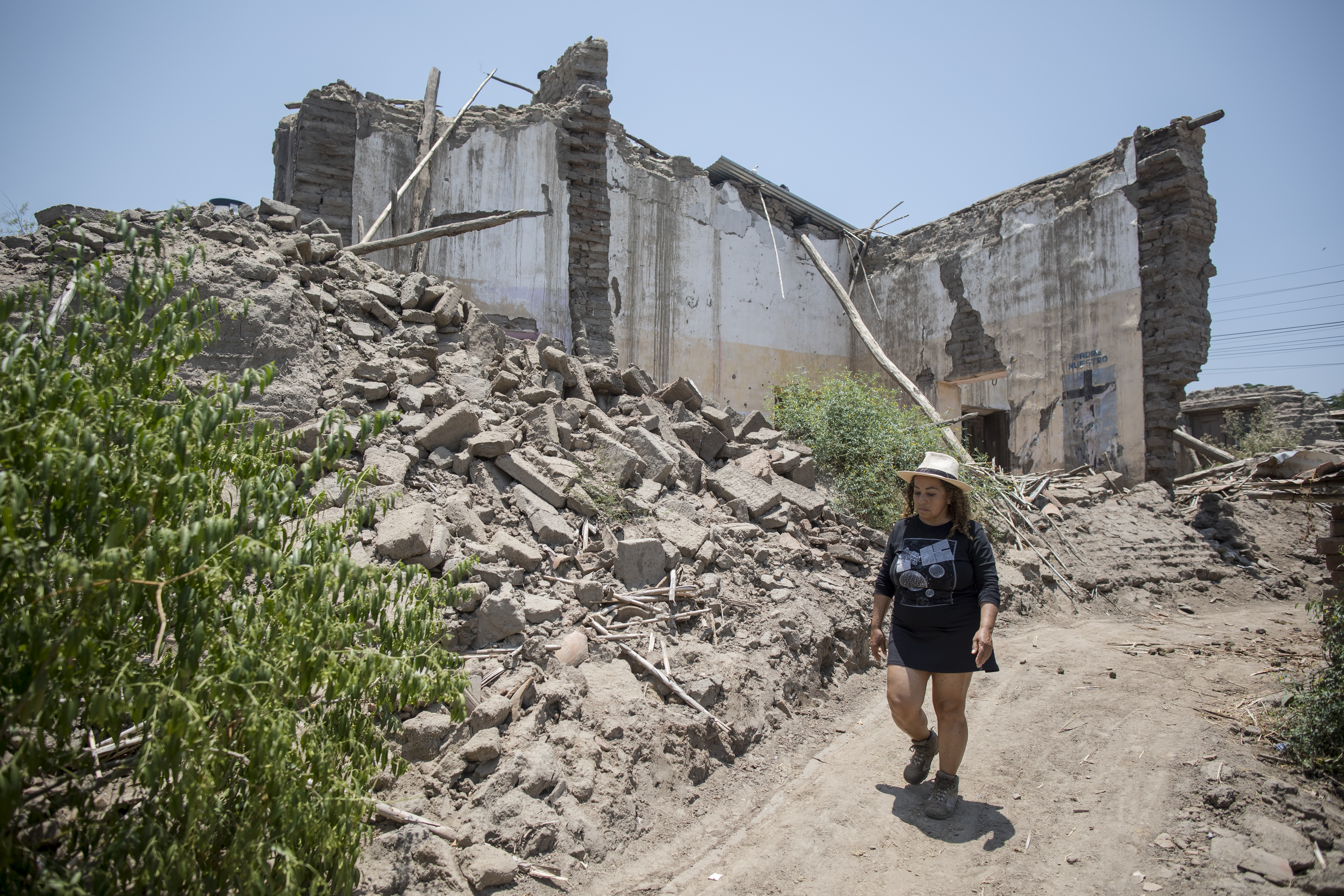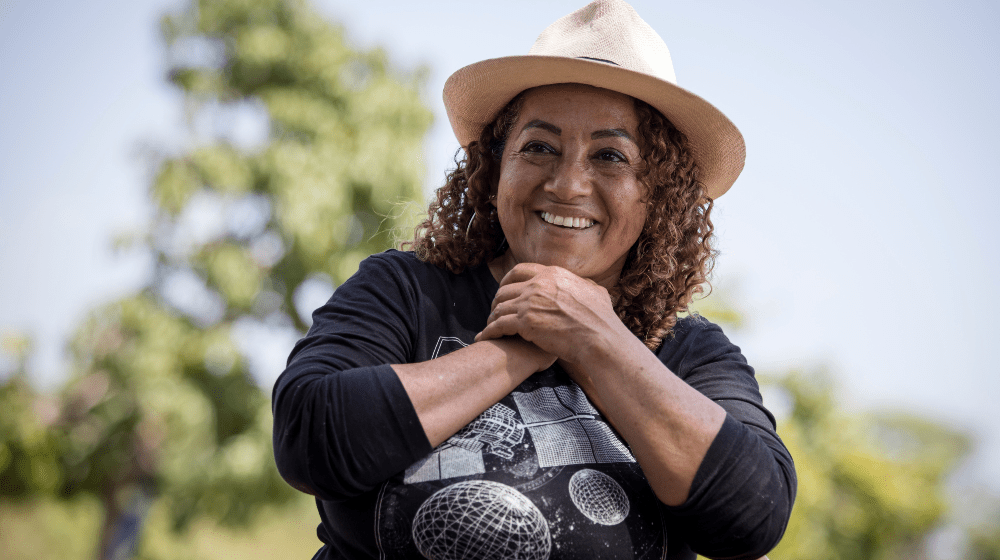Lilian León, founder and current vice-president of the El Palenque Association of Afro-Yapateran Craftspeople, in Piura, has become a strategic ally for “Saving Lives,” a project promoted by the United Nations Population Fund (UNFPA). Like her, other thirty-six local women leaders, together with teams of brigade members deployed in three departments of northern Peru, have been able to provide crucial help and information to hundreds of women facing an increased risk of gender-based violence. In addition, they have established thirteen safe sites in various communities to provide additional support to these women.

Lilian León knows well when women are in danger in Yapatera, a village of less than 8,000 inhabitants in the middle of the Piura department. At 48 years of age, she knows every corner of her village, as well as every look of anguish, every restrained sob, every cry for help from a friend or a neighbor. Even more so when a major emergency looms over them, such as the El Niño phenomenon, the COVID-19 pandemic, the Yaku cyclone, or the heavy floods that hit northern Peru at the beginning of this year, resulting in 20 deaths, over 230,000 people affected and 23,963 displaced.
“We women are the most affected. Especially those of us who are heads of households,” says Lilian, as she watches the sunset over Yapatera. She cannot help but remember the first months of 2023 when the heavy rains over Tumbes, Piura and Lambayeque aggravated the vulnerability to which the women of her department are accustomed. “Without light, water, internet, and telephone services, how could we seek help? Who would listen to you? A woman who was undergoing psychological violence, who was being beaten or raped, had nowhere to turn to,” she adds.
An activist for women’s rights based on her work as an Afro-descendant craftswoman, Lilian decided she would not stand idly by. The heavy rains might have punctured the roof of her house and collapsed the old building where the El Palenque Association of Afro-Yapateran Craftspeople, founded by her and other village women nine years ago, operated. Still, her commitment to her sisters was intact. “Right now, I am part of the Women’s Network, which supports Yapateran women survivors of violence. My job is to spot cases,” she says. This first approach is crucial for UNFPA’s mobile brigades, deployed in Piura since May, to provide psycho-emotional support and legal aid to women victims of gender-based violence. The action, which involves the participation of thirty-six other local women leaders, is part of the joint response of the United Nations System with funding from the Central Emergency Response Fund (CERF).
Seeing Lilian surrounded by other women from her village is enough to notice their trust in her. During a sorority workshop to promote solidarity among women, organized by UNFPA and its local partners, she welcomes the last women to arrive, exchanges smiles with some of them and makes sure that they all receive one of the 6,500 dignity kits delivered in recent months—as part of the actions of the “Saving Lives” project—to empower women and help them recover their dignity through the provision of personal hygiene and menstrual products. “I feel I am a role model for other women, both young and old. They have always seen me as an example. That’s what they say to me: you’re entrepreneurial and always a fighter,” she says.
Lilian experienced what many women have had to experience since the climate crisis long before. She does not need to go into details. When she looks them in the eye, she lets them know that she understands them, that they are not alone, and that there is a way out. “I was able to find that way out on my own. But some women need help because they feel alone or, sometimes, even guilty about the treatment they receive,” she says. She decided to work shoulder to shoulder in every activity and intervention carried out by the mobile brigades, made up of women lawyers, psychologists, and social workers. The increase in the number and active participation of women and girls in the safe spaces, where women from the community can turn to for empowerment, information, and support networks, is also the result of the efforts of leaders like Lilian in alliance with their local governments. In total, thirteen spaces have been created and are managed in Piura (6), Tumbes (4), and Lambayeque (3).
“I do believe that, little by little, we are changing the problem of violence. There is a before and after the arrival of the brigade members. We feel stronger,” says Lilian, as she leaves the sorority workshop, which some thirty women attended.
Change is necessary and inevitable in the Piura department. According to figures from the 2022 Demographic and Family Health Survey (ENDES) conducted by the National Institute of Statistics and Informatics (INEI), 56% of women ages between 15 and 49 have suffered some form of violence from their partners. The 5,169 violence cases handled between January and September of 2023 at the 19 Women Emergency Centers spread throughout the department reflect the most critical months as a consequence of the climate emergency but also of a deeply rooted cultural feature. “Unfortunately, Piura is still considered a very macho region,” explains Carlos Arcaya, regional coordinator of the Women Emergency Centers of the Ministry of Women and Vulnerable Populations (MIMP).
From the State, the MIMP’s Aurora National Program, through the Women Emergency Centers (CEM), not only includes attention to violence cases, but also coordinates work with other organizations and preventive actions involving the community itself. “We have women mentors, volunteers, who allow us to spot and address cases at the community level,” Arcaya explains. Lilian is one of them: Afro-descendant, craftswoman, farmer, single mother, the youngest of twelve siblings. A woman willing to eradicate gender-based violence from Yapatera. “And I will continue as far as my strength allows me, as long as I can breathe, so that we can see empowered girls in my village, girls free of violence and abuse,” she says.
Before night falls on Yapatera, Lilian and her fellow women finishes molding with her hands a clay mask. They all watch her proudly. For a moment, she forgets the flooded houses, the buildings in rubble, and the forecasts of a new and much more intense El Niño phenomenon. The clay lets her think only of what she has begun to build with the women of her village. “Clay connects us to one another and helps us strengthen our friendship, sisterhood, and sorority bonds,” she says as she finishes her work.


